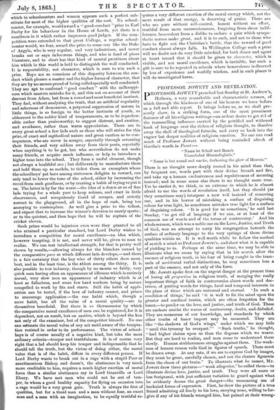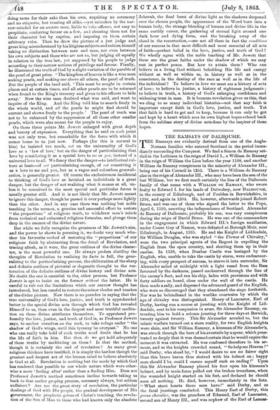• PROFESSOR JOWEIT AND REVELATION.
PROFESSOR JOWEIT preached last Sunday at St. Andrew's, Holborn, a very remarkable and characteristic sermon, of which through the kindness of one of his hearers we have before us a full and able report. It brings before us, as we shall pre- sently show, in a striking form, one of the most prominent features of all his religious writings—an ardent desire to get rid of the trammelling influence exerted by the petrified and withered husk of Language over the riches of religious thought, to dissolve away the shell of theological formula, and carry us back into the vaguer but deeper realities of religious emotion. No one can read much of Professor Jowett without being reminded afresh of Goethe's words in Faust :— " Name in Sehall und Rauch Umnebelnd Himmelsgluth."
"Name is but sound and smoke, darkening the glow of Heaven."
There is no thought more deeply rooted in his mind than that by frequent use, words part with their divine breath and fire, and take up a human exclusiveness and repulsiveness of meaning instead ; and in some sense also there is no thought more true. Yet he carries it, we think, to an extreme in which he is almost afraid to use the words of revelation itself, lest they should (as they sometimes may) interpose a new veil instead of removing one, and in his horror of mistaking a surface of disguising colour for true light, he sometimes mistakes true light for a surface of disguising colour. It is good for us sometimes,' he said last Sunday, to get rid of language if we can, or at least of the common use of words and of the terms of controversy.' And his whole sermon, which was a noble one on the Love, Justice, and Truth of God, was an attempt to carry his congregation beneath the surface of ordinary language to the very springs of those divine qualities within us. It is well worth while to follow the method of so rich a mind as Professor Jowett's, and show what it is capable of yielding to us. Perhaps at the same time, we may be able to illustrate what we mean by saying that in his search after the essence of religious truth, in his fear of being caught in the tram- mels of accidental verbal distinctions, he may sometimes lose a part of the essence, and not only of the form.
Mr. Jowett spoke first on the urgent danger at the present time of losing all proportion in religious truth, of merging the really important things of faith in controversies about words and doc- trines, of putting words for things, local and temporal interests in the place of those which are universal and eternal. 'In such a condition of things,' he said it is well to fix the mind upon the greater and cardinal truths, which are often forgotten for the lesser,—to ponder on the love, and justice, and truth of God. These are anchors amidst the waves of controversy, doubt, and disbelief. They are measuress of our knowledge, and standards by which other truths of lesser import may be measured. They are like "the shadows of God's wings," under which we may hide "until this tyranny be overpast." "Such truths," he thought,
"had higher claims upon us than the dogmas which we weave. But they are hard to realize, and men come to understand them slowly. Human stubbornness struggles against them. The weak- ness of human reason veils God in figures of speech. These must be drawn away. At any rate, if we are to express God by images, they must be great, carefully chosen, and not the chance figments from the chaos of our brain." To illustrate what he meant, Mr. Jowett drew three pictures—" weak allegories," he called them—to illustrate divine love, justice, and truth. They were all more or
less Scriptural, with just sufficient variation to guard against what he evidently deems the great danger—the unmeaning use of
hackuied forms of expression. First, he drew the picture of a true friend admitting all freely to his love, envying none, willing to for- give if any of his friends wronged him, but pained at their wrong-
doing more for their sake than his own, requiring no ceremony and no etiquette, but trusting all alike,—yet mistaken by the nar- row-minded for an austere man, liable to take offence, not easy to propitiate, conferring favour on a few, an3 choosing them not for their character but by caprice, and imposing on them certain arbitrary rules. Then he drew the picture of a just judge and great king misunderstood by his litigious subjects and suitors, himself taking no distinction between man and man, not even between his own subjects and those who are not so, but judging all equally in relation to the true law, yet supposed by his people to judge according to their narrow notions of privilege and favour. Finally, he illustrated the truth of God by a slight variation of the parable of the pearl of great price. The kingdom of heaven is like a wise man seeking pearls, and seeking one above all others, the pearl of truth. But the people of the land said, This must be sought in certain places and at certain times, and all other pearls are to be returned when found to the King's treasury and given to his officers to hide away.' Now the wise man doubted what was said, and went to inquire of the King. And the King told him to search freely in the whole world, and all the pearls he might find should be current and shown freely to the people.' The pearl of truth was not to be enhanced by the suppression of all those other smaller pearls, which were also meant for the people to enjoy.
On these three points Mr. Jowett enlarged with great depth and beauty of expression. Everything that he said on each point was not only true, but remarkable for the force with which it comes home to us just now. Perhaps (for this is natural to him) he insisted too much, not on the universality of God's love as a law of love,' but on the danger of particularizing that love by considering it as a special love to me or you, instead of a universal love to all. We fancy that the danger—to intellectual cul- ture at least—of not particularizing enough, of not conceiving it as a love to me and you, but as a vague and colourless generali- zation, is generally greater. Of course the exclusiveness incidental to thinking of God's love as lavished on individuals is a great danger, but the danger of not realizing what it means at all, un- less it be conceived in the most special and particular forms is usually greater still. And it is not likely that Mr. Jowett meant to ignore this danger, though he passed it over perhaps more lightly than the other. And in any case there was nothing but noble teaching in the sermon, a genuine and successful effort to restore "the proportions" of religious truth, to withdraw men's minds from technical and exhausted religious formulas, and plunge them deep in the essence of the divine nature.
But while we fully recognize the greatness of Mr. Jowett's aim, and the power he shows in pursuing it, we doubt very much whe- ther his favourite method of restoring the " proportions " of our religious faith by abstracting from the detail of Revelation, and tracing afresh, as it were, the great outlines of the divine charac- ter, is the most powerful one. He always prefers distilling the thoughts of Revelation to realizing its facts in fall, the gene- ralizing to the particularizing process, the obliteration of the sharp and definite outlines of pictorial or dogmatic thought to the res- toration of the definite outlines of divine history and divine acts. NO doubt the one is essential to the, other process, but Professor Jowett is apt to insist on the former without the latter. He is careful to rub out the limitations which our narrow thought has introduced, but less careful to restore the minor shades and touches of the divine picture. Now there is no paradox in saying that the true universality of God's love, justice, and truth is apprehended better in the special divine acts through which God has revealed Himself to us, than even in the deepest and most truthful medita- tion on those divine attributes themselves. To apprehend pro- foundly the love, justice, and truth of God is, as Professor Jowett says, to anchor ourselves on the rock, to take refuge under "the shadow of God's wings, until this tyranny be overpast." No one who can really take hold of such truths need doubt that he has the life of faith in him. But then do we get hold adequately of these truths by meditating on them ? Is that the method, though it is certainly the end of revelation ? As many great religious thinkers have testified, it is simply the hardest though the greatest and deepest act of the human mind to believe absolutely in God at all. Revelation is nothing but the mode by which God has rendered that possible to our whole nature which were other- wise a mere feeling after' rather than a finding Him. Does not Professor Jowett's method sometimes incline towards taking us back to that earlier groping process, necessary always, but seldom sufficient ? Are not the great story of revelation, the particular dealings of God with His people, the gradual development of His government, the prophetic germs of Christ's teaching, the revela- tion of the Son of Man to those who had known only the absolute Jehovah, the final burst of divine light as the shadows deepened over the chosen people, the appearance of the Word born into a human body, the strange blending of human and divine life in the same earthly career, the gathering of eternal light around one dark hour and dying form, and the breaking away of the cloud in the resurrection,—are not all these in fact the conditions of our success in that most difficult and most essential of all acts of faith—perfect belief in the love, justice, and truth of God ? We wholly agree with the noble teaching of Mr. Jowett that these are the great faiths under the shadow of which we may rest in perfect peace. But how to attain them ? Who can believe in a living God without beholding His life and energy without as well as within us, in history as well as in the conscience, in the destiny of the race as well as in the life of the individual? To believe in love we must see a history of acts of love ; to believe in justice, a history of righteous judgments ; to believe in truth, a history of God's enlarging confidence and widening trust in man. It is because revelation gives us this, that we cling to so many individual histories—not that any faith is important except faith in God's love, justice, and truth. Yet that faith is hard to get and to keep, because it can only be got and kept by a heart which sees its own highest hopes echoed back from the sublime story of divine seta done by the inspirer of those hopes.































 Previous page
Previous page